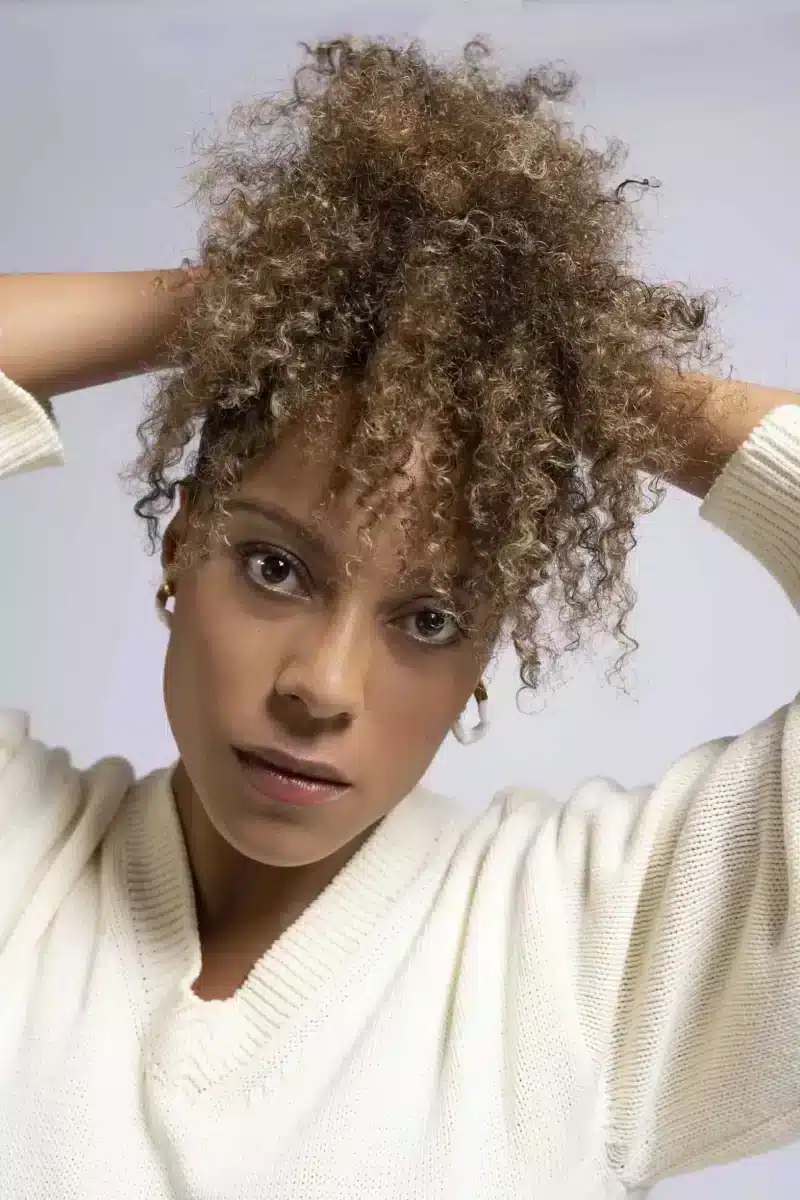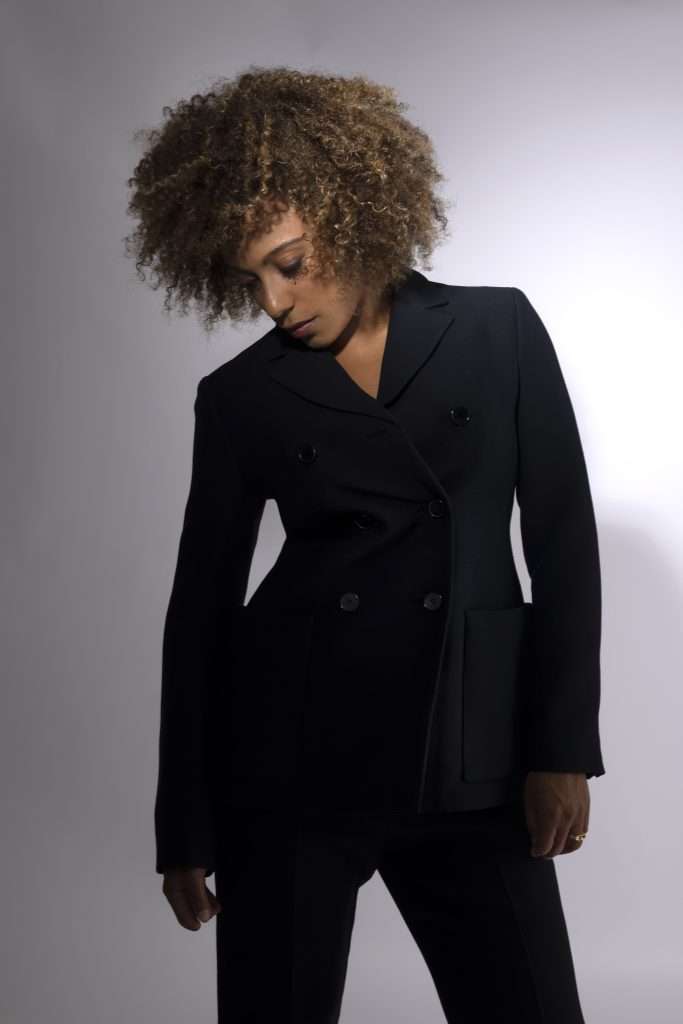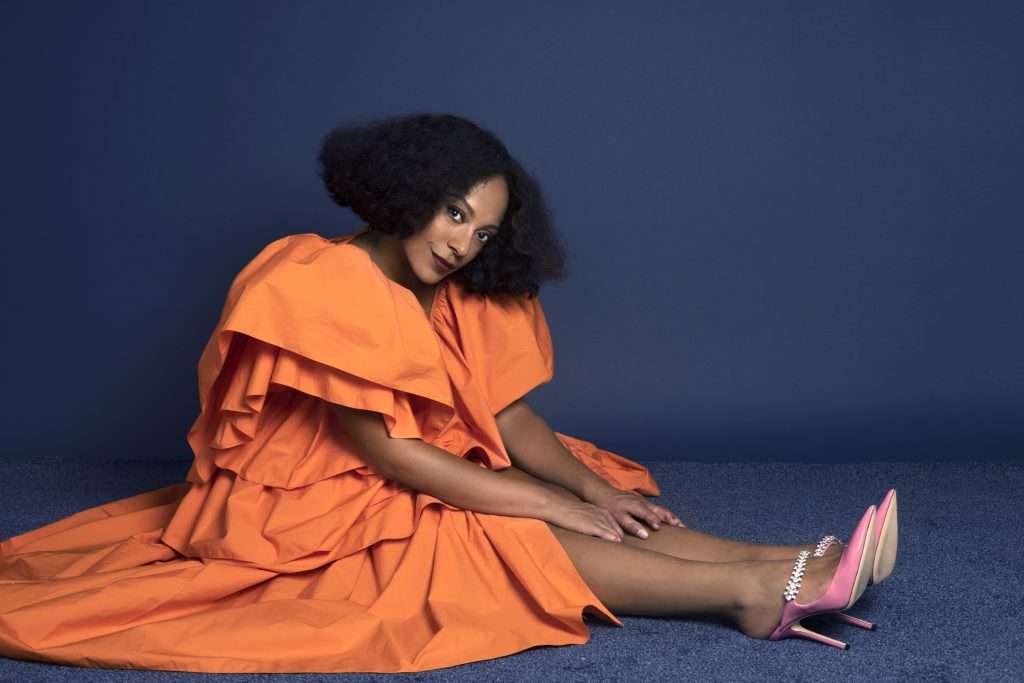
Wearing a duka scarf inside her sunny London apartment, Rosalind’s face is glowing when I speak to her. With a smile that spreads from cheek to cheek, she explains how she returned from a ‘holiday from Hell’ in Columbia after her boyfriend sprained his ankle hiking in the Andes. Carted to safety on the back of a South African mule, we joke, immediately, that it was lucky his ride was faster than the hit TV show she’s currently starring in: Slow Horses.
The polar opposite of the show’s straightlaced spy Louisa Guy, Rosalind is hopelessly likeable; possessing none of the ego that you’d suspect for a young actor who could boast they’ve played alongside the likes of Mathew Broderick, Tilda Swinton, Dev Patel and Gary Oldman in theatre, T.V and film.
Instead, Rosalind is strangely relaxed. After repaying her hellish holiday story with my own nightmare in Cyprus, we laugh; politely, and then, openly, about how to respond to life’s most absurd moments. ‘I’m optimistic about suffering,’ she says, ‘I’ve had some bad news, a death, recently, and sometimes you don’t know if you should laugh or cry…but I’m hopeful always, about how crazy life is.’ As I talk back, I forget, for a moment, who should be interviewing who…
One thing about your career that impresses me is how literary your roles have been. Howard’s End, The Personal History of David Copperfield, Uncle Vanya, Slow Horses are all adaptations from books…I’d love to know what draws you into these sorts of works?
That’s a good question. I’ve never really thought of it like that, but it’s true. I suppose I’m more interested by the quality of the script and what’s in the work. Characters from novels—like Yelena from Uncle Vanya—can have so much depth to them. It excites you as an actor seeing the minds these amazing writers create, where there’s all this nuance and psychology, and in the end, when a script keeps that depth, I’m sucked in.
How closely do you use the books in your own acting? Or are you more focused on the script?
It depends on the book.
Uncle Vanya I had to read very, very closely. But for most of them, you have to start with the script because it’s its own interpretation. And those are the lines you’re bouncing off with the actors in rehearsals. The books can help to build up your understanding, but…
[laughs]
…when I got The Personal History of David Copperfield, [the director] Iannucci said I didn’t have to read the whole thing—there was this sort of in-joke it was a bloody long book. I did read it. I promise! But I have to add, as a confession, I don’t really love Dickens.
He did get paid by the word…but do you have a favourite book you’d like to star in?
Noughts & Crosses. It might sound basic, but that story moved me so much when I read it as a young teen. It’s such a gripping, clever story about love and politics; one that doesn’t feel contrived at all.
You’re currently getting ready to continue your role as the disgraced spy Louisa Guy for the third season of Slow Horses after huge critical acclaim. To me, it’s like 24 meets The Office, but could you tell us a little more about the show and what attracted you to it?
It is a little like The Office…I think it’s just a very British premise. You have this group of spies from MI5 who’ve all messed up at work and are sent to this dumping ground in Slough, and they keep on trying to redeem themselves. There’s a lot of action and thriller elements, but there’s also this comedy about unconventional people who feel embarrassed working next to each other.
It’s got dark and great writing, but it likes to laugh. There’s a good balance to either side.
Building on the office vibe, you were filming for almost a year under the COVID lockdown. It has such an incredible ensemble cast with the likes of Gary Oldman and Kristin Scott Thomas. What was the initial experience like on set?
It was strange at first, but always felt really good. We became like a family spending so much time together. With all the news and developments, we really did put each other at ease. In a way, it was similar, but kind of opposite community, that our characters were in…
What was the most demanding scene for you?
I really enjoyed the double-acts with my partner Minn [Dustin Demi-Bruns]; he’s such a fantastic actor and we really bounced off each other, building up that level of trust where you’re such opposites takes time to perfect though.
At the end of season two, as well, with Louisa’s interrogation sequence…it was a dark bit to play, but, it didn’t feel really hard. If I’m honest, the whole experience was wonderful.
How would you describe Louisa Guy’s character? What arc does she have?
You know she’s such a badass really. It’s a bit of a mystery as to why she’s there as she’s so competent but at the same time—she’s not good at letting people in, she’s not good at trusting other or showing her emotions. She’s probably a very different character to myself.
By the end, though, when they’re at the funeral and she’s grieving in front of people, that scene really resonated with me. I was so happy for the character to develop, but it struck a chord as well…
For a show about professionals haunted by their failures, are we going to find out what went wrong with Louisa’s career in the next season?
Not from me! That’s for Will [the writer] to reveal.
But at a personal level, I’d like to know—what’s the worst thing you’ve screwed up on a job?
[Laughs]
Oh…God. That’s a good question I never been asked. But it does suits the show.
There’s a lot, I guess, but nothing particular comes to my mind. I’ll have to think.
You’re not getting off that easy.
[Laughs]
I’ll give you a bit more time.

Two years before Slow Horses, you starred in your first feature film The Wonderful History of David Copperfield by Armando Iannucci. You played Agnes [Copperfield’s second wife] and the film is loosely based off Dickens own life.
Can you tell me what that experience was like?
You know it was such a whirlwind. It was my very first feature film, and Armando was so welcoming, he really backed me in way that made it feel incredible to work under him. He brought so much joy and confidence on to the set.
It was a big shift from play and television though, and I felt nervous at the start. I think I was taken aback a bit—especially walking into the dressing room and seeing people like Dev Patel and Tilda Swinton! They were incredible to watch, Swinton especially. There was a moment early on, I think, where she could see I was a little…overwhelmed. Before a rehearsal she just touched my hand lightly, as if I to say, you’re here now, and it was so strange, but it calmed me down completely.
After that, I had such a great time throughout the film.
One thing I’m curious about though, is you mentioned in a previous interview around the film that ‘colour blind’ casting isn’t a word you particularly like. Can you tell me why?
It’s weird isn’t it? I don’t know. Maybe it’s just the phrase…it feels so naff, like, it’s almost too perfect.
And I suppose Armando always said he picked the person who had the right feel for the part, and that’s how I saw it too. You do it so often on stage. I was a good match for this fun, bubbly person and it didn’t feel like there was a political angle to it, it wasn’t something we ever really spoke about as a crew. It was just automatic…
But then the moment you finish and go into rounds of interviews, there’s all these questions from journalists. Like, ‘what’s it like to play a white female character?’ or ‘do you feel you’re changing politics’? After a while, to be honest, it made me feel kind of shit. I don’t know. I don’t really look at myself in the mirror as a particular kind of person, I’m just…me. And suddenly I felt like I was given this huge part and it was about representing something else…that I didn’t exist as an actor.
It’s confusing.
It might be ironic for me to say—but perhaps you didn’t want to be labelled?
Yeah. Yeah, that’s it exactly.
But even while it did make me feel kind of shit, I get it too. It’s sad, but society has these labels for a reason. At the same time, a part of me just wishes it really was blind, that you could play these roles without it being a big deal, without it being this big question you’re asked about. Like you were anyone else, really.
It’s difficult to talk about. Maybe we’re not ready to have that conversation yet…maybe you have to have a few years of this kind of attitude to get to that point.
I’m curious as you touched on it earlier, but between your various roles in television, film and theatre, what’s been your favourite form to act in?
There’s something true about theatre. It’s alive because of the audience. You get to connect in a unique way. I love television and I love film, but plays are always different. It’s where I began and, you know, each night is unique. It has something special in every performance.
I loved Uncle Vanya but doing The Starry Messenger with Mathew Broderick was so interesting with the live audience. He was so fun as an actor, but you’d have moments where you’d notice the audience didn’t respond to us as much one night, or responded in a different way, and it would change the whole thing slightly.
I remember once, after a kissing scene with me and Mathew, there was a little laugh…we ended up cutting that bit short. Mathew was older than me and I think he was self-conscious when we were off-stage. But later it turned out it had nothing to do with us at all: it was a couple laughing at a private joke.
The confusion though […] it all gets layered in. You can’t help but connect with each other in a play.

That’s interesting. And you graduated from LAMDA at 27. Where there any previous careers that tempted you?
I was a bit nervous about acting, although I always wanted to do it. For university, I did Mandarin and Spanish and worked in an office, then ended up moving to Ghana [where my father is from]. I did a bit of TV production for a while, and then made this big decision to come back to London and follow what I really wanted.
It felt daunting but I was lucky enough to get work after graduating in theatre; it felt like such a relief, finally, doing what I dream about.
Speaking of Ghana, you’re writing your own script about a two-hour conversation with your Ghanian father. Can you tell me a little more about it? You mentioned you were writing it quite a while ago…
[Laughs]
Yes! Wow. How long ago did I say that?
Seven years.
[Laughs]
That long? Gosh. I still am working on it. The script is based on a drive I had with my father when I was a student. We spoke for ages and ages: about life, about how it felt for him to emigrate.
It’s on my desk still. I’ve been meaning to finish it this year but I can be a perfectionist, and it’s a topic that means a lot for me. My father…he passed recently…
I’m sorry.
It’s okay! It’s okay! You’re right too. You know, you can’t keep waiting on things.
[Smiles]
So thanks for reminding me.
I’m sure you’ll do a wonderful job. But we’ve got one last question before we go. Have you made up your mind yet?
Oh…
Greatest fuck up at work?
You know, after talking about [ Howard’s End ], I was reminded of one moment.
One night, well, there’s a scene in the middle where Mathew and I are quite close and…I don’t know how…but one of us suddenly sneezed over the other person. When it happened, it was pretty obvious. So I laughed…then he laughed…
I’m laughing too.
And the whole crowd laughed! We laughed for minutes and minutes. And when we got over the giggles, the two of us made a comment in-character and just went back to the scene.
Was it a real fuck up then?
Weirdly, it was the most entertaining performance. When you do something so bizarre, the audience kind of love it…



